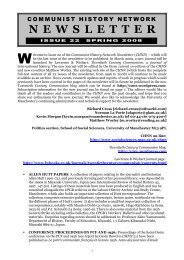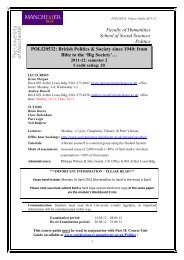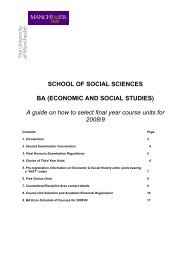second year course outlines 2012-2013 - School of Social Sciences ...
second year course outlines 2012-2013 - School of Social Sciences ...
second year course outlines 2012-2013 - School of Social Sciences ...
You also want an ePaper? Increase the reach of your titles
YUMPU automatically turns print PDFs into web optimized ePapers that Google loves.
Please note that all essay marks are provisional until confirmed by the external examiner<br />
and the final examinations boards in June.<br />
Students are welcome to discuss their essay with their tutor or the <strong>course</strong> convenor during<br />
their <strong>of</strong>fice hour.<br />
Feedback<br />
The <strong>School</strong> <strong>of</strong> <strong>Social</strong> <strong>Sciences</strong> (SoSS) is committed to providing timely and appropriate<br />
feedback to students on their academic progress and achievement, thereby enabling<br />
students to reflect on their progress and plan their academic and skills development<br />
effectively. Students are reminded that feedback is necessarily responsive: only when a<br />
student has done a certain amount <strong>of</strong> work and approaches us with it at the appropriate fora<br />
is it possible for us to feed back on the student's work. The main forms <strong>of</strong> feedback on this<br />
<strong>course</strong> are written feedback responses to assessed essays and exam answers.<br />
We also draw your attention to the variety <strong>of</strong> generic forms <strong>of</strong> feedback available to you on<br />
this as on all SoSS <strong>course</strong>s. These include: meeting the lecturer/tutor during their <strong>of</strong>fice<br />
hours; e-mailing questions to the lecturer/tutor; asking questions from the lecturer (before<br />
and after lecture); presenting a question on the discussion board on Blackboard; and<br />
obtaining feedback from your peers during tutorials.<br />
Assessed Essay Titles<br />
1. For one <strong>of</strong> the following – homeopathy, creationism, parapsychology, psychoanalysis –<br />
which <strong>of</strong> the following claims is true?<br />
(a) It’s good science; (b) It’s bad science; (c) It’s pseudoscience.<br />
NOTE ON QUESTION 1. You’re welcome to make use <strong>of</strong> websites to find examples <strong>of</strong><br />
specific claims put forward by proponents <strong>of</strong> homeopathy etc. and attempts to defend the<br />
relevant area as good science. However in all other respects you should treat this as a<br />
normal philosophy essay and treat web sources accordingly (e.g. just because someone<br />
says something on a website, it doesn’t mean they have any expertise or authority!).<br />
2. Is there ever a good reason to believe a scientific theory?<br />
3. Under what circumstances, if any, does an observation confirm a scientific theory?<br />
4. Does falsificationism provide a better account <strong>of</strong> the rationality <strong>of</strong> scientific enquiry than<br />
inductivism?<br />
5. COURSE OUTLINE<br />
Week Beginning Topic<br />
Reading (for the<br />
following Monday)<br />
1 28 Jan Introduction & Bortolotti 2008, Ch.1<br />
Relevant<br />
chapter <strong>of</strong><br />
textbook<br />
128

















